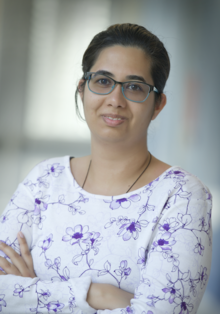The Daily Bulletin is published by Internal and Leadership Communications, part of University Communications
Contact us at bulletin@uwaterloo.ca
Submission guidelines
Editor:
Brandon Sweet
University Communications
bulletin@uwaterloo.ca
The Amit and Meena Chakma Awards for Exceptional Teaching by a Student for 2021 will be presented to four student teachers this year. Jeff Casello, associate vice-president, graduate studies and postdoctoral affairs, and chair of the selection committee provided the report to the University's Senate on Monday this week.
 Rollen D’Souza, a PhD student in Electrical and Computer Engineering, is recognized by his students and colleagues for his exceptional adaptability to the COVID-19 pandemic, his leadership skills, teaching methods, and approachability. D’Souza was able to develop online labs to a high quality during the COVID-19 pandemic. An undergraduate student remarked that D’Souza “put in extra effort to ensure the ECE380 labs were exceptional. Rollen made extra materials such as lab videos to ensure that online classes were maintaining the same level of quality as in-person labs.” A colleague pointed out that D’Souza played an indispensable role in offering online labs over the Spring of 2020, “it would have been impossible without his extraordinary efforts.” As well, several students have felt strongly supported by D’Souza. An undergraduate student remarked that “Rollen made it feel like we were all working on the lab together, which is a breath of fresh air during this isolating pandemic.” Students and faculty members are truly grateful for his dedication.
Rollen D’Souza, a PhD student in Electrical and Computer Engineering, is recognized by his students and colleagues for his exceptional adaptability to the COVID-19 pandemic, his leadership skills, teaching methods, and approachability. D’Souza was able to develop online labs to a high quality during the COVID-19 pandemic. An undergraduate student remarked that D’Souza “put in extra effort to ensure the ECE380 labs were exceptional. Rollen made extra materials such as lab videos to ensure that online classes were maintaining the same level of quality as in-person labs.” A colleague pointed out that D’Souza played an indispensable role in offering online labs over the Spring of 2020, “it would have been impossible without his extraordinary efforts.” As well, several students have felt strongly supported by D’Souza. An undergraduate student remarked that “Rollen made it feel like we were all working on the lab together, which is a breath of fresh air during this isolating pandemic.” Students and faculty members are truly grateful for his dedication.
D’Souza has been a teaching assistant for SE 101, SE 465, ECE 459, MATH 213, ECE 351, and a lab instructor for ECE/SE 380.
 Melanie Mungalsingh, a PhD student in Optometry, is recognized by her students and colleagues for her exceptional teaching skills, accessibility, approachability, and problem-solving abilities. An optometry student remarked that Mungalsingh “went the extra mile to make sure she provided the best guidance, even if it meant researching problems on her own and getting back to students outside of work hours.”A colleague remarked that “Mungalsingh presents material in a variety of ways and adapts her language as needed to ensure students understand the concepts that she is enforcing.” As well, several of her students pointed out that she has always made herself available and accessible to answer questions about campus life or confusing scientific concepts outside scheduled labs and office hours. Students have truly felt supported by Mungalsingh.
Melanie Mungalsingh, a PhD student in Optometry, is recognized by her students and colleagues for her exceptional teaching skills, accessibility, approachability, and problem-solving abilities. An optometry student remarked that Mungalsingh “went the extra mile to make sure she provided the best guidance, even if it meant researching problems on her own and getting back to students outside of work hours.”A colleague remarked that “Mungalsingh presents material in a variety of ways and adapts her language as needed to ensure students understand the concepts that she is enforcing.” As well, several of her students pointed out that she has always made herself available and accessible to answer questions about campus life or confusing scientific concepts outside scheduled labs and office hours. Students have truly felt supported by Mungalsingh.
Mungalsingh continues to build her teaching portfolio by taking part in the Fundamentals of University Teaching Certificate with the Centre for Teaching Excellence. She also earned a Certificate in Online Course Facilitation at the University of Waterloo to learn how to deliver engaging online courses.
Mungalsingh has been a lab instructor for OPTOM 337, OPTOM 387, OPTOM 255, OPTOM 152, BIOL 130, BIOL 273, BIOL 373.

Quinn Worthington, a master's student in Earth and Environmental Sciences, is recognized by her students and colleagues for her exceptional teaching, approachable personality, and passion for student success. Worthington’s personality has allowed students to approach her when they need help. A colleague remarked that “Quinn creates a positive atmosphere and students are naturally drawn to her and feel very comfortable asking her questions.”
Worthington creates a risk-free learning environment by taking students’ incorrect answers, pointing out other criteria for students to consider, and guiding them to the correct answer. In the end, “students have turned their failures into a success.” Students have found Worthington to be exceptionally helpful. A student remarked that “I found Quinn to be exceptionally helpful. My first impression was how she was very approachable and knowledgeable, which made me feel more comfortable inquiring about geology.”
Worthington has been a TA for EARTH 231 and EARTH 390.
 Charbel Azzi, a PhD Candidate in Systems Design Engineering, is recognized by his students and colleagues for his exceptional teaching, enthusiasm, and accessibility. Azzi took the time and effort to develop his lectures appropriately to fit the remote teaching environment. A faculty member remarked that Azzi is “an enthusiastic and inspiring instructor, who goes the extra mile to ensure that students have the best possible learning experience in the pandemic. SYDE 182 is a very technical course that is hard to teach, but Charbel masters it.” Students prefer his approach to teaching over the textbook as it improves their conceptual understanding of the material. A colleague remarked, “I was not surprised when I learnt that students felt that Charbel should write his own textbook on Engineering Dynamics.” Azzi does not just simply teach Engineering Dynamics, “he helps students develop appropriate problem-solving skills which will help students approach any engineering problem.” As well, students pointed out that Azzi would make time outside of tutorials and office hours to help students with questions and course concerns.
Charbel Azzi, a PhD Candidate in Systems Design Engineering, is recognized by his students and colleagues for his exceptional teaching, enthusiasm, and accessibility. Azzi took the time and effort to develop his lectures appropriately to fit the remote teaching environment. A faculty member remarked that Azzi is “an enthusiastic and inspiring instructor, who goes the extra mile to ensure that students have the best possible learning experience in the pandemic. SYDE 182 is a very technical course that is hard to teach, but Charbel masters it.” Students prefer his approach to teaching over the textbook as it improves their conceptual understanding of the material. A colleague remarked, “I was not surprised when I learnt that students felt that Charbel should write his own textbook on Engineering Dynamics.” Azzi does not just simply teach Engineering Dynamics, “he helps students develop appropriate problem-solving skills which will help students approach any engineering problem.” As well, students pointed out that Azzi would make time outside of tutorials and office hours to help students with questions and course concerns.
Azzi has been an instructor for SYDE 182 and a TA for BME 182, and ME 321.
The Amit & Meena Chakma Award for Exceptional Teaching by a Student (AETS) awards are open to all students who have a formal teaching role at the University of Waterloo. Up to four awards are given annually in recognition of excellence in teaching of all kinds by registered students (e.g., teaching assistant, laboratory demonstrator, sessional lecturer).

By Etta Di Leo. This Global Impact Report article was originally published on Waterloo News.
Every year, more than 4.5 million people need blood transfusions in Canada and the United States. That amounts to about 36,000 RBC units per day for the US alone. Transfusions are needed for trauma response, surgery and cancer care. The medical system relies on a complex system of blood donations to meet that need. Without a sufficient, reliable supply of safe blood, the health-care system comes into jeopardy.
That’s where Shane Kilpatrick (MASc ’17, MBET ’18) and his company, Membio, is working to make a difference. The Canadian startup is developing technology to manufacture fully functioning red blood cells at an industrial scale.
“Researchers have been manufacturing blood in the lab for the last few decades,” says Kilpatrick. “But they haven’t been able to produce blood cost effectively and at the scale that’s needed to offset the need for donations. Our end goal is to replace donation with manufactured blood.”
While getting enough donated blood is a significant issue, the variability of the supply poses even more challenges. For example, for patients who receive regular transfusions, they can develop alloantibodies to the mismatched antigens present on donor blood, which can cause adverse reactions.
“Your blood is as unique as you are as a person,” says Kilpatrick. “It becomes a big challenge for people who require recurring transfusion as they run into problems with variability. As patients receive ongoing transfusions, patients become alloimmunized and require blood matched on additional antigens, which is regularly more difficult and expensive to procure.”
Membio is concentrating on developing the bio-manufacturing processes that will allow them to produce blood cells in a lab on the scale that’s needed to meet the growing demand. The lab-produced blood will not only be pathogen and toxin free, it will also have a highly compatible profile, eliminating the issues that regular transfusion recipients experience.
Kilpatrick began thinking about red blood cell production while working on a completely unrelated research project in an oil patch. He noticed that the bio filters used to treat methane gas production were highly inefficient. He realized that our bodies solve much the same problem when it delivers oxygen to every cell in the body.
“I started thinking about replicating the circulation system outside of the body. I decided to pursue my MSc in chemical engineering at the University of Waterloo to help me learn how to develop the technology. It was in business school (MBET) that I realized the ultimate application of the technology was to create red blood cells in a way that would make it commercially viable.”
Once the idea was planted, Kilpatrick credits Velocity with providing the support he needed to get the company off the ground.
“Membio would not exist without the University of Waterloo and Velocity. Velocity provided access to research facilities I just didn’t have and Velocity Science, a partnership between Velocity and the Faculty of Science, helped with some of the consumables when I was getting started and didn't have any money. The experience of learning how to rapidly prototype and test ideas was invaluable, especially because we are trying to do things that have never been done before. You need to be able to learn from failures and test things out. It was critical to have that support.”
Once Membio became more established as a business, Kilpatrick and the company were accepted into IndieBio, a biotech incubator in San Francisco.
“IndieBio taught me that nothing is too bold or too big. Having incredibly smart people backing our ambitious vision has been a game-changer.”
Kilpatrick sees an opportunity for universities to foster the spirit of innovation and help students who show promise as entrepreneurs to succeed with the commercialization of their ideas.
While university support is critical, Kilpatrick would like to see the government play a larger role in helping Canadian companies like Membio develop the next generation of biotech.
“Biotechnology is a capital-intensive industry. In Canada, if we want to advance innovation in the health-care sector, government partners need to play a more active role. In the US, the National Institutes of Health (NIH) invests billions of dollars each year directly into companies that are doing the research. There’s no equivalent in Canada. With health research, for commercialization, you need capital upfront, which is more challenging in Canada’s more conservative approach to investing.”
For now, the focus remains squarely on their mission to ensure the world has a safe and sustainable supply of blood. While the pandemic may have slowed some of his plans, Kilpatrick anticipates opening Membio’s new facility and growing the team over the next 18 to 24 months.
“Although we have started this journey, the finish line is still down the road and we need help to get there. Hiring is a big focus for us in 2021 and we’re looking for brilliant scientists, engineers, and problem solvers to join our team and help us redefine what is possible.”

A message from Marketing and Undergraduate Recruitment.
On Saturday, March 20, professors, students, and staff from across the University connected with prospective students during the March Virtual Open House (MVOH).
Hosted by Marketing and Undergraduate Recruitment, MVOH was developed to replace the in-person March Break Open House which typically takes place each year. The virtual event featured live information sessions, 1:1 chats, digital downloads, and video Q&As with students and professors.
Over 5,900 people registered to attend from around the world, and 3,110 checked in on event day. Hundreds more continue to log in to watch the recorded presentations since the event has concluded.
Marketing and Undergraduate Recruitment continues to offer a range of virtual offerings for prospective students. If you know a Grade 12 student interested in applying, encourage them to visit our tours and events website to learn more and to register for an upcoming offering.
Special thanks to our campus recruitment colleagues and partners who have supported our new and ongoing undergraduate recruitment initiatives.
 Waterloo's Child Online Research Activities Lab (CORAL) is still doing laboratory studies during lockdown, and there are opportunities to participate in their research from home.
Waterloo's Child Online Research Activities Lab (CORAL) is still doing laboratory studies during lockdown, and there are opportunities to participate in their research from home.Here's the latest Nutrition Month "Myth vs. Fact" supplied by Health Services Dietitian Sandra Ace:
Myth: Raw vegetables are better for you than cooked.
Truth: Eating a wide variety of both cooked and raw vegetables is good for you.
Eat them however you prefer them; just remember the more you eat, the better the health benefits! The theory that raw veggies have a nutritional advantage over cooked is unfounded. In fact, in some vegetables, cooking increases the availability of certain nutrients because it helps to break down plant’s cell walls, allowing more nutrients to be released. When compared to raw, cooked tomatoes are higher in lycopene, a red plant pigment and antioxidant which studies show may be linked to a lower risk of some cancers and heart disease. Carotenoids like beta-carotene are more readily available in cooked carrots. The body converts beta-carotene to vitamin A which supports growth and development, vision, reproductive, immune and skin health. Lutein, another plant antioxidant that may play a role in preventing age-related macular degeneration, is more easily absorbed when leafy greens like spinach, kale and Swiss chard are cooked than when eaten raw.
It is true that cooking methods can reduce water-soluble vitamins like Vitamin C. The key to preserving the nutritional value of cooked vegetables is to use quick or waterless methods. Steam, microwave or stir fry until they are tender-crisp rather than mushy. Flavour and nutrient absorption will be enhanced when your veggies are prepared or served with a small amount of healthy fat, like olive oil. Oven roasting is a great way to enhance the flavour of veggies, which develop a deliciously rich, caramelized flavour.
Probably no veggie says “spring is here” more than asparagus, which is a source of many nutrients. While Ontario asparagus won’t be available for a few weeks yet, here are instructions from Ontario Asparagus for oven roasting this unique veggie. “Arrange 1 or 2 pounds of washed and trimmed asparagus spears in a single layer in a large shallow baking dish. Drizzle with 1 to 2 tbsp. oil and sprinkle with salt and pepper. Bake, uncovered, at 500° F (260° C) for 8 to 10 minutes or until tender but still slightly firm.” I find that thicker stalks work better for roasting than thin, pencil-like stalks. To make clean-up easier, line the pan with parchment paper. For even more flavour, season with finely grated lemon zest, a splash of balsamic vinegar or lemon juice or a sprinkle of parmesan before serving.
Students can visit the Student Success Office online for supports including academic development, international student resources, leadership development, exchange and study abroad, and opportunities to get involved.
Instructors can visit the Keep Learning website to get support on adapting their teaching and learning plans for an online environment.
Updated Course templates are now available within your course in LEARN to help you build and edit your content and assignment pages quickly.
The following workshops, webinars, and events are offered by the KL team (CTE, CEL, ITMS, LIB):
Independent Remote Course Design Essentials. Self-directed, continuous self-enrollment course in LEARN.
PebblePad Users Group (CTE7526), Wednesday, March 24, 2:00 p.m. to 3:30 p.m.
Integrative and Experiential Learning Session (CTE7700), Wednesday, March 31, 2:00 p.m. to 3:30 p.m.
Employees can access resources to help them work remotely, including managing University records and privacy of personal information. Here are some tips for staying healthy while working from home.
Stay informed about COVID cases on campus by consulting the COVID case tracker.
Whether you’re a student or faculty member, the Writing and Communication Centre has virtual services and programs to help you with all of your academic writing needs. This term we have added evening and weekend one-to-one appointments with our peer tutors, and our NEW one-to-one workshops, where you can learn the content directly from one of our writing advisors.
Co-op students can get help finding a job and find supports to successfully work remotely, develop new skills, access wellness and career information, and contact a co-op or career advisor.
The Centre for Career Action assists undergraduates, graduate students, postdocs, staff, faculty, and alumni through navigating career services that are right for them. You can attend a one-on-one appointment or same day drop-in session at the CCA for assistance with cover letter writing, career planning and much more. You can also book an appointment online or visit our Live Chat to connect with our Client Support Team. The CCA is here to help you.
If you feel overwhelmed or anxious and need to talk to somebody, please contact the University’s Campus Wellness services, either Health Services or Counselling Services. You can also contact the University's Centre for Mental Health Research and Treatment. Good2Talk is a post-secondary student helpline available to all students.
The Library has published a resource guide on how to avoid information overload.
The Faculty Association of the University of Waterloo (FAUW) continues to advocate for its members. Check out the FAUW blog for more information.
The University of Waterloo Staff Association (UWSA) continues to advocate for its members. Check out the UWSA blog for more information.
The Indigenous Initiatives Office is a central hub that provides guidance, support, and resources to all Indigenous and non-Indigenous campus community members and oversees the university Indigenization strategy.
The Waterloo Indigenous Student Centre, based at St. Paul’s University College, provides support and resources for Indigenous students, and educational outreach programs for the broader community, including lectures, and events.
WUSA supports for students:
Peer support (Visit https://wusa.ca/peersupport to book an appointment):
Bike Centre – Will be reopening soon.
Campus Response Team, ICSN, Off Campus Community and Co-op Connection all available online. Check https://wusa.ca for more details.
Food Support Service food hampers are currently available from the Turnkey Desk on weekdays from 7:30 a.m. to 7:00 p.m. in the Student Life Centre. If you have any questions please email us at foodsupport@wusa.ca.
Centre for Academic Policy Support - CAPS is here to assist Waterloo undergraduates throughout their experience in navigating academic policy in the instances of filing petitions, grievances and appeals. Please contact them at caps@wusa.ca. More information is available.
WUSA Commissioners who can help in a variety of areas that students may be experiencing during this time:
WUSA Student Legal Protection Program - Seeking legal counsel can be intimidating, especially if it’s your first time facing a legal issue. The legal assistance helpline provides quick access to legal advice in any area of law, including criminal. Just call 1-833-202-4571.
Empower Me is a confidential mental health and wellness service that connects students with qualified counsellors 24/7. They can be reached at 1-833-628-5589.
Athletics & Recreation Facility Information (Red Control Zone)
In-Person Fitness Classes ($4/class)
Healthy Warriors at Home (Online Fitness)
Drop-in to Warrior Virtual Study Halls on Wednesdays from 5:30 p.m. to 7:00 p.m. Come together in this virtual space to set goals and work independently or in groups each week.
Livestream Exercises for Waterloo staff: Join us for an energy boosting Bootcamp or a fast and effective Express Home Workout! Open to UW Staff and subsidized by the Staff Excellence Fund.
Renison English Language Institute continues to offer virtual events and workshops to help students practice their English language skills.
Warriors vs. Laurier Blood Donation Battle. Join your fellow Warriors, donate blood and help us win the Blood Battle against Laurier for a second year in a row. Set up a profile or add the PFL code: UNIV960995 to your account if you have a blood.ca account already. Questions? Contact WarriorsInfo@uwaterloo.ca.
Faculty of Mathematics, Waterloo Women’s Impact Network Webinar Series, “Creating Your Own Path: Opportunities, Sustainability and Lessons Through COVID-19,” Wednesday, March 24, 12:00 p.m. ET, virtual event.
Noon Hour Concert: Song Sonata, Wednesday, March 24, 12:30 p.m. The title piece performed by the Ekleipsis Guitar Trio will be Glenn Buhr’s Song Sonata. Free, online.
Waterloo.AI and AMC: Industry Day - Webinar Event, Thursday, March 25, 8:30 a.m. to 4:00 p.m.
Centre for Eye and Vision Research webinar, “Pioneering Vision Research for Preventing and Reversing Visual Impairment,” Thursday, March 25, 9:30 p.m. to 11:00 p.m. via Zoom.
Library Town Hall, Thursday, March 25, 1:00 p.m. to 2:00 p.m. Register.
Scenes from “carried away on the crest of a wave,” Thursday, March 25, 11:30 a.m., Friday, March 26, 7:30 p.m. and Saturday, March 27, 7:30 p.m., Tickets $10 General, $5 Students and Seniors.
Responding to Disclosures of Sexual Assault, Thursday, March 25, 2:30 p.m. to 4:00 p.m.
Employee Wellness Session: Beyond Stigma – Increasing Our Understanding of Mental Health in the Workplace (offered by the Employee and Family Assistance Plan and Homewood Health), Friday, March 26, 12:30 p.m. to 1:30 p.m. Register by March 23.
NEW - Virtual Wen-Do Women’s Self-Defence Workshop: Women and non-binary campus community members are welcome to join a virtual Wen-Do Self-Defence workshop. In this workshop you'll gain self-protection skills and strategies within a feminist, anti-racist, anti-oppression framework. Friday, March 26 1:00 p.m. to 3:00 p.m.
NEW - CrySP Speaker Series on Privacy, "When Models Learn Too Much," featuring David Evans, Department of Computer Science, University of Virginia, Monday, March 29, 1:30 p.m.
On this week's list from the human resources department, viewable on the UWaterloo Talent Acquisition System (iCIMS):
Secondments/Internal temporary opportunities
The Daily Bulletin is published by Internal and Leadership Communications, part of University Communications
Contact us at bulletin@uwaterloo.ca
Submission guidelines
The University of Waterloo acknowledges that much of our work takes place on the traditional territory of the Neutral, Anishinaabeg, and Haudenosaunee peoples. Our main campus is situated on the Haldimand Tract, the land granted to the Six Nations that includes six miles on each side of the Grand River. Our active work toward reconciliation takes place across our campuses through research, learning, teaching, and community building, and is co-ordinated within the Office of Indigenous Relations.